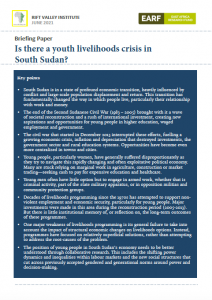South Sudan is in a state of profound economic transition, heavily influenced by conflict and large-scale population displacement and return. This transition has fundamentally changed the way in which people live, particularly their relationship with work and money.
The end of the Second Sudanese Civil War (1983 – 2005) brought with it a wave of societal reconstruction and a rush of international investment, creating new aspirations and opportunities for young people in higher education, waged employment and government.
The civil war that started in December 2013 interrupted these efforts, fuelling a growing economic crisis, inflation and depreciation that destroyed investments, the government sector and rural education systems. Opportunities have become even more centralized in towns and cities.
Young people, particularly women, have generally suffered disproportionately as they try to navigate this rapidly changing and often exploitative political economy. Many are stuck relying on marginal work in agriculture, construction or market trading—seeking cash to pay for expensive education and healthcare.
Young men often have little option but to engage in armed work, whether that is criminal activity, part of the state military apparatus, or in opposition militias and community protection groups.
Decades of livelihoods programming since the 1970s has attempted to support non-violent employment and economic security, particularly for young people. Major investments were made in this area during the reconstruction period (2005-2013). But there is little institutional memory of, or reflection on, the long-term outcomes of these programmes.
One major weakness of livelihoods programming is its general failure to take into account the impact of structural economic changes on livelihoods options. Instead, programmes have focused on relatively superficial solutions, rather than attempting to address the root-causes of the problem.
The position of young people in South Sudan’s economy needs to be better understood through collaborative research. This includes the shifting power dynamics and inequalities within labour markets and the new social structures that cut across previously accepted gendered and generational norms around power and decision-making.




